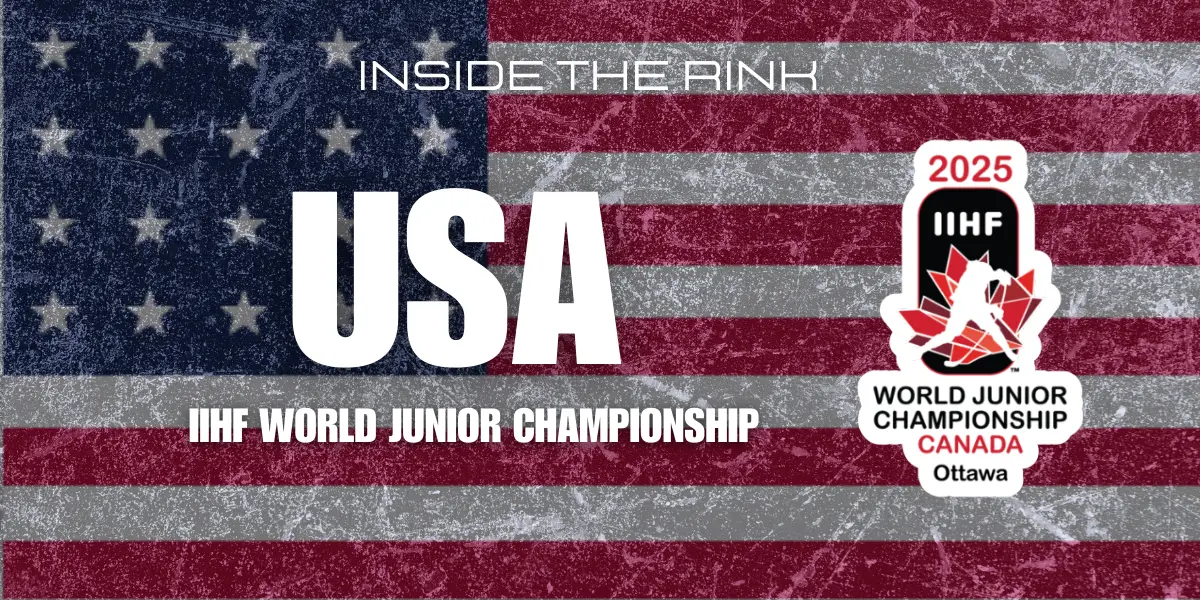
It has been a golden week in American hockey circles. For the first time in program history, Team USA has captured consecutive gold medals at the World Junior Championship. The boys did it in style, defeating Finland 4-3 in overtime in Ottawa on Sunday to cap off a thrilling run. This group of Americans didn’t just win—they made history, embraced the pressure, and left an indelible mark on USA Hockey, which continues to be a powerhouse at the Junior level.
It wasn’t always smooth sailing, but the 2025 squad found a way to get it done, showing what happens when grit meets chemistry.
Let’s dive into the biggest takeaways from a Golden tournament to remember.
The Rise of David Carle:
The word “generational” gets tossed around way too often these days, especially when we’re talking about prospects. Yet, when you look at David Carle, you wonder if the label fits.
Carle’s coaching journey began under extraordinary circumstances. The Tampa Bay Lightning selected him in the seventh round of the 2008 NHL Draft, but his playing career was cut short by a heart condition discovered during the NHL Combine. Instead of letting that setback define him, Carle focused on coaching. Denver honored his scholarship and joined the program as a student manager before working up the ranks.
At just 35 years old, he’s already accomplished what many coaches only dream of, making him an obvious candidate for NHL teams looking to inject fresh ideas behind the bench.
He’s led the Denver Pioneers to two national championships in three years and delivered back-to-back World Juniors gold medals for Team USA—a first in USA Hockey history. Now 35, Carle isn’t just one of the best young coaching prospects in hockey; he’s becoming the guy every NHL team has their eye on.
Winning is hard—no one in hockey needs to be told that—but Carle makes it look almost automatic. His winning percentage at Denver is .690, putting him ahead of legends in the program, including current St. Louis Blues head coach Jim Montgomery. Last year in Sweden and this summit in Ottawa, his teams combined for 13-1, with the lone blemish being an OT group play loss to Finland.
The 2025 World Junior Championship is the crowning achievement of Carle’s international career so far, and we know it will be because it’s been revealed he won’t return in 2026.
The unit wasn’t the stacked “super team” he had last year. Sure, they were talented, but this team had real question marks—depth issues on defense, inconsistent secondary scoring, and a roster that had to integrate 15 new players alongside 10 returnees from last year’s gold-medal squad. Despite all that, Carle’s team found a way.
The gold medal game itself was a masterclass. The Americans got worked in the first period against Finland but kept things close. Then, when they went down 3-1 in the second, they clawed their way back. Carle and his staff made adjustments—smart ones. They tightened things defensively and spread the workload up front, giving the forwards fresh legs. Suddenly, the energy shifted.
Then there’s Teddy Stiga, the guy who didn’t even dress for the tournament opener, scoring the Golden goal in overtime. That makes Carle’s coaching so special—he knows how to push the right buttons at the right time. Every player on that roster had a role, and everyone bought into it. That’s how you win gold.
Carle is not in any rush to leave Denver for the NHL. He’s been asked about it, and his answer is always the same—he’ll wait for the right NHL opportunity. The 35-year-old is in a position to be picky and deserves to be. Pulling him away from what he built in the mile-high City will take more than any offer.
At 18, a heart condition ended his playing career before it could begin, but Denver honored his scholarship, and Carle transitioned into coaching. From student manager to assistant coach in the USHL with to returning to Denver as an assistant and eventually taking over as head coach, he’s excelled at every level. By his fourth season as the bench boss, he had a national championship under his belt. Last Spring, he led the Pioneers to their record 10th national title and second in three years, taking down some of the most stacked teams in college hockey at Boston University and Boston College.
What’s most impressive about Carle isn’t just the results—it’s how he goes about it. He has a calm demeanor but holds his players to a high standard without burning them out, and he prepares his teams like every game is the biggest of the season. Excellence isn’t just a goal for Carle; it’s a habit.
It’s only a matter of time before we see him coaching at the NHL, and when that day comes, he’ll be just as successful as he’s been everywhere else.
USA Gold proves USHL is here to stay:
The U.S. made history by winning back-to-back gold medals at the 2025 IIHF World Junior Championship in Ottawa, and the United States Hockey League (USHL) continues to be the world’s premier development path. Despite recent changes to NCAA rules allowing Canadian Hockey League (CHL) players to join Division I programs, the USHL remains unmatched in preparing players for college and professional hockey.
The NCAA’s new rule letting CHL players retain their eligibility to play college hockey is changing Junior hockey. Starting August 1, CHL players who receive small stipends for living expenses can join U.S. universities without jeopardizing their eligibility. It gives young players more flexibility in deciding whether to stick with the CHL or head to college for a shot at high-level hockey combined with academic opportunities. It’s a big deal for the future of North American hockey development.
Some think this might challenge the USHL’s ability to attract players, and think they should merge with the CHL, but this Gold Medal proved the league is built to thrive. The USHL isn’t just about exposure; it’s about setting players up for long-term success on and off the ice in America. The league’s alumni shined at this year’s World Juniors, with 22 former USHL players on Team USA’s roster. From Detroit Red Wings prospect Trey Augustine’s clutch goaltending alongside future Los Angeles Kings backstopped and reigning Clark Cup champion with the Fargo Force Hampton Slukynsky
to Teddy Stiga’s golden overtime winner, these players are living proof of the USHL’s impact. Stars like projected 2025 first overall pick James Hagens, Cole Hutson (WSH), and Brandon Svoboda also stepped up big time for the U.S., with Ryan Leonard (WSH) earning tournament MVP honors. Hutson became the first defenseman to lead the tournament in scoring with eleven points.
Coach Carle started as an assistant with the Green Bay Gamblers and led the charge. Fellow USHL alumni Brett Larson and Garrett Raboin rounded out the coaching staff.
The U.S. has medaled in the last three World Juniors and taken gold in three of the previous five tournaments. It shows that USA hockey and the USHL are keeping pace and leading the charge. So, while the new NCAA rule might bring changes, this World Juniors triumph shows that the USHL is here to stay as the gold standard for player development.
USA Used Villain as Motivation:
Over the past two years, Team USA’s group of ’04s, ’05s, and ’06s has not just won back-to-back World Junior Championships—they’ve leaned into being the villain while doing it.
The team thrived in the most hostile environments, taking on the role of the bad guy and using it as fuel. Last year, they avenged Sweden, taking the gold in Gothenburg. This year? That New Year’s Eve showdown against Canada—a 4-1 win that sealed the Group A title and silenced an entire Canadian crowd.
From there, they didn’t let up. A 7-2 thrashing of Switzerland in the quarterfinals, a methodical 4-1 win over Czechia in the semis, and the ultimate statement: a gutsy, come-from-behind win over Finland to claim gold. Every step of the way, The Americans embraced the noise, the pressure, and even the boos, channeling it into a level of play that screamed, “We’re here to take over.”
Dynasties aren’t built without a little edge; this group had it in spades. If there’s one thing these boys proved that fans should remember, it’s that being the villain can be beautiful.
Victory for Johnny and Matthew:
The Gold Medal wasn’t just about the team on the ice—it was about honoring an American hockey legend, Johnny Gaudreau, and his brother Matthew, whose lives were tragically cut short in August by an alleged drunk driver in their South Jersey hometown.
Team USA kept an open locker for Gaudreau throughout the tournament, draped with his iconic No. 13 jersey. It was more than just a symbol; it was a constant source of inspiration. “Any time you look over in the corner of the locker room and you see him, it always puts a smile on my face,” Leonard, a Boston College forward and Washington Capitals prospect, said in a heartfelt tribute video. I know he’s going to have my back out there during the game.”
When the gold medals were theirs, the team gathered around Gaudreau’s jersey for a photo, dedicating their victory to Johnny and Matthew.
Gaudreau’s impact on USA Hockey runs deep. He starred on the 2013 World Junior Championship team, leading all players with seven goals during their gold-medal run. Over the years, he represented Team USA five times at the IIHF World Championships, amassing 43 career points—the most ever by an American in the tournament’s history.
His last professional appearance in the red, white, and blue was at the 2024 IIHF World Championships, where he notched 11 points in eight games. He played alongside Leonard and Augustine. His legacy, like his No. 13 jersey in that locker room, continues to inspire and won’t be forgotten.
From Comm Ave to World Gold: BC and BU Power Team USA’s Dominance:
Hockey runs deep on Commonwealth Avenue these days. The rivalry between Boston University and Boston College isn’t just heating up on the ice—it was all over Team USA’s dominant World Junior Championship run, too. Between the two schools, Boston University and Boston College sent a combined eight players to Ottawa, and they left their fingerprints all over the gold medal.
On offense for BC, there was the Golden Goal from Stiga, and the explosive BC Line of Leonard (WSH), Gabe Perreault (NYR), and Hagens. In the bottom six, BU’s Cole Eiserman (NYI/BC) and Svoboda, provided clutch tallies in crucial moments. On the blueline, Hutson (BU/WSH), was the first American to lead the tournament in points, but there was also the steady presence of BC duo Aram Minnetian (BU/DAL), and Drew Fortescue (BU/NYR). Together, they accounted for 36 of the 37 goals scored in the tournament, showing how much of the American’s firepower came from this stretch of Boston hockey’s finest. The only goal they didn’t touch? Oliver Moore (MIN/CHI) is setting up Danny Nelson (Notre D, NYI) in the quarterfinal blowout against Switzerland.
Nearly every time the red, white, and blue lit the lamp, the play started or ended with someone from Comm Ave crew. They brought grit, skill, and swagger that comes with playing for two of college hockey’s most storied programs. Rivalry or not, they came together when it mattered most.
BC’s Leonard and Perreault were workhorses up front, while Eiserman looked like a future NHL star. On BU’s side, Hutson dazzled with his puck-moving, and Minnetian and Svoboda brought the kind of two-way game that makes NHL scouts drool. It wasn’t just a showing for USA Hockey; it was a showcase for the rivalry that will make every BC-BU matchup must-watch for years to come.

ITR 47: Then There Was Nothing – Inside The Rink
Discover more from Inside The Rink
Subscribe to get the latest posts sent to your email.



